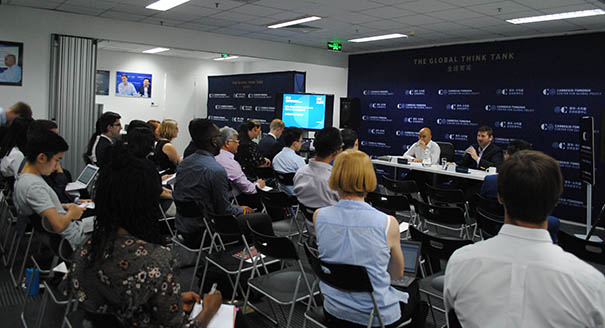Registration
You will receive an email confirming your registration.
During Xi Jinping’s first state visit to the United States in 2015, much attention was placed on agreements made by the two leaders on cyber security and commitments on South China Sea policy. Less well known is that the two nations signed a memorandum of understanding (MoU) to designate funding toward cooperation on international development. The agreement serves as a guiding framework for curbing global poverty through cooperation on issues like food security, public health, and humanitarian assistance and disaster response.
The Carnegie-Tsinghua Center’s Tang Xiaoyang moderated a discussion with Justin Finnegan, who led the negotiations on the U.S.-China development agreement at the United States Agency for International Development. Finnegan discussed the MoU’s significance, how it was developed, and the importance of cooperative global development measures.
This event was off the record.
Discussion Highlights
- U.S. and Chinese Approaches to Aid: The U.S. Agency for International Development (USAID) was founded in the early 1960s to formalize U.S. interests in foreign institutions. One explained that the United States and China have different approaches to aid. China does not consider itself a donor in traditionally Western terms and places its focus on South-South cooperation. In contrast to the bottom-up U.S. system and Washington’s historical commitment to development, China is still building its development capacity and adopting a top-down approach, which a panelist argued poses a challenge to the effectiveness of on-the-ground communication between U.S. and Chinese officials. Due to China’s remarkable transformation and unprecedented success in poverty reduction, a discussant said, the international community is especially interested in evolving China’s global footprint.
- Trust and Transparency: A panelist said that trust proved to be both the main driver behind the MoU and the greatest challenge to closer U.S.-China cooperation. A lack of grassroots communication and coordination between the countries has caused misunderstandings, delayed decision-making, and affected the overall effectiveness of development operations in the past, the discussant continued. Chinese officials, for example, are unable to participate in local donor working groups, which resulted in an increase in mistrust from other countries, a panelist said. China and the United States have a common interest in the alleviation of human suffering, the panelist added, and the improvements in communication, coordination, and transparency envisioned in the MoU represent an important contribution toward the overall effectiveness of development efforts in third countries.
- Bringing in Multiple Agencies: In contrast to other MoU negotiations, this particular case involved senior development officials from multiple agencies from both countries, one discussant said. Since development efforts rely on effective coordination between the different agencies within any one government, the negotiations were more reflective of the realities on the ground, a panelist said. The MoU’s success, a discussant argued, can be attributed to the strong commitment of negotiators on both sides who were able to overcome biases and misunderstandings that inhibited previous negotiations.
- The Trump Administration: A panelist noted that President Trump wants other countries to share responsibility with the United States in addressing global issues but much ambiguity surrounds the new administration’s policies. While Trump has taken a bilateral approach to global affairs, the panelist said that the administration has not tried to change the MoU. The panelist expected joint efforts in development to continue under Trump’s presidency. Although one discussant said Trump is more concerned with business than development, they said the president has expressed interest in the Belt and Road Initiative. While the panelist argued that this interest is primarily rooted in the initiative’s potential to benefit U.S. businesses, the significance of the project to President Xi and his development efforts present an opportunity for further discussion on closer U.S.-China collaboration in development.
Tang Xiaoyang
Tang Xiaoyang is a resident scholar and deputy director of the Carnegie–Tsinghua Center and an associate professor in the Department of International Relations at Tsinghua University.
Justin Finnegan
Justin Finnegan was the founding managing director of the Mountain Hazelnuts Group. He previously served as the senior deputy assistant to the administrator of the U.S. Agency for International Development under the Obama administration.
